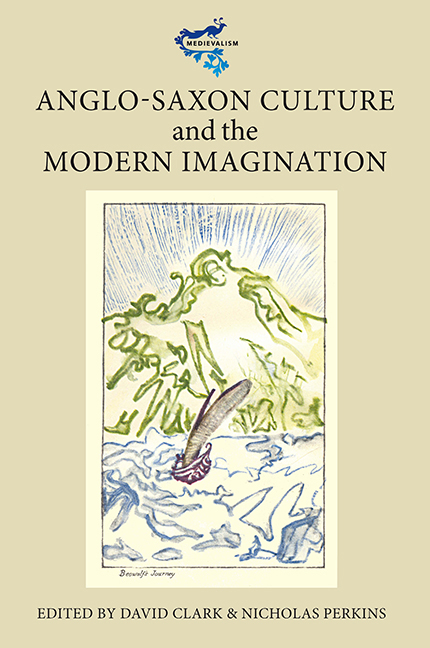Book contents
- Frontmatter
- Contents
- List of Illustrations
- Contributors
- Foreword
- Acknowledgements
- Abbreviations
- Introduction
- 1 From Heorot to Hollywood: Beowulf in its Third Millennium
- 2 Priming the Poets: The Making of Henry Sweet's Anglo-Saxon Reader
- 3 Owed to Both Sides: W.H. Auden's double debt to the literature of the North
- 4 Writing for an Anglo-Saxon Audience in the Twentieth Century: J.R.R. Tolkien's Old English Chronicles
- 5 ‘Wounded men and wounded trees’: David Jones and the Anglo-Saxon Culture Tangle
- 6 Basil Bunting, Briggflatts, Lindisfarne, and Anglo-Saxon Interlace
- 7 BOOO Seeing Beowulf in Pictures and Print
- 8 Window in the Wall: Looking for Grand Opera in John Gardner's Grendel
- 9 Re-placing Masculinity: The DC Comics Beowulf Series and its Context, 1975–6
- 10 P.D. James Reads Beowulf
- 11 Ban Welondes: Wayland Smith in Popular Culture
- 12 ‘Overlord of the M5’: The Superlative Structure of Sovereignty in Geoffrey Hill's Mercian Hymns
- 13 The Absent Anglo-Saxon Past in Ted Hughes's Elmet
- 14 Resurrecting Saxon Things: Peter Reading, ‘species decline’, and Old English Poetry
- Index
4 - Writing for an Anglo-Saxon Audience in the Twentieth Century: J.R.R. Tolkien's Old English Chronicles
Published online by Cambridge University Press: 20 April 2017
- Frontmatter
- Contents
- List of Illustrations
- Contributors
- Foreword
- Acknowledgements
- Abbreviations
- Introduction
- 1 From Heorot to Hollywood: Beowulf in its Third Millennium
- 2 Priming the Poets: The Making of Henry Sweet's Anglo-Saxon Reader
- 3 Owed to Both Sides: W.H. Auden's double debt to the literature of the North
- 4 Writing for an Anglo-Saxon Audience in the Twentieth Century: J.R.R. Tolkien's Old English Chronicles
- 5 ‘Wounded men and wounded trees’: David Jones and the Anglo-Saxon Culture Tangle
- 6 Basil Bunting, Briggflatts, Lindisfarne, and Anglo-Saxon Interlace
- 7 BOOO Seeing Beowulf in Pictures and Print
- 8 Window in the Wall: Looking for Grand Opera in John Gardner's Grendel
- 9 Re-placing Masculinity: The DC Comics Beowulf Series and its Context, 1975–6
- 10 P.D. James Reads Beowulf
- 11 Ban Welondes: Wayland Smith in Popular Culture
- 12 ‘Overlord of the M5’: The Superlative Structure of Sovereignty in Geoffrey Hill's Mercian Hymns
- 13 The Absent Anglo-Saxon Past in Ted Hughes's Elmet
- 14 Resurrecting Saxon Things: Peter Reading, ‘species decline’, and Old English Poetry
- Index
Summary
The discovery of a new, previously unknown Old English manuscript is not something we can expect to happen in our lifetime. However, the following opening of an Old English book may well be unfamiliar to most Anglo-Saxonists:
Her onginneð séo bóc þe man Pennas nemneð, Ј héo is on þréo gedǽled; se forma dǽl is Valinórelúmien þæt is Godéðles géargetæl, Ј se óþer is Beleriandes géargetæl, Ј se þridda Quenta Noldorinwa oþþe Pennas nan Goelið þæt is Noldelfaracu. þás ǽrest awrát Pengolod se Úþwita of Gondoline, ǽr þám þe héo abrocen wurde, Ј siþþan æt Siriones hýþe Ј æt Tavrobele in Toleressean (þæt is Ánetége), þá he eft west cóm. And þás béc Ælfwine of Angelcynne geseah on Ánetége, þá þá he æt sumum cerre funde híe; Ј he geleornode híe swa he betst mihte Ј eft geþéodde Ј on Englisc ásette.
Here begins the book which is called ‘Pennas’, and it is divided into three parts. The first is ‘Valinórelúmien’, or the Annals of the Land of the Gods; the second is the Annals of Beleriand, and the third ‘Quenta Noldorinwa’ or Pennas nan Goelith, which means the Tale of the Noldoli. These were first written by Pengolod the Wise of Gondolin, before its fall, and after at Sirion's Haven, and at Tavrobel in Tol Eressëa (that is the Lonely Isle) after his return unto the West, and there seen and translated by Ælfwine of the Angelcynn, when he once discovered them; and he studied them as best he could and translated them into English.
These lines are the beginning of one of three fragments of Old English prose chronicles or annals associated with the vast structure of J.R.R. Tolkien's Middle-earth legendarium. Indeed, this is where the word ‘Middle-earth’, still in its original Old English form middangeard, first enters the mythology. Quite characteristically for Tolkien, these Old English fragments were quickly drafted in the early 1930s and then left unfinished, just like their much more extensive Modern English counterparts. Also characteristically, they exist in several manuscripts with minute but elaborate variations of style and even dialect displaying Tolkien's typical niggling perfectionism. This combination of chance and dedicated effort has resulted in a situation which is peculiarly reminiscent of original Anglo-Saxon texts, many of them now extant only in scattered notes or fragments, or surrounded by writings in a different, more prestigious language (Latin).
- Type
- Chapter
- Information
- Anglo-Saxon Culture and the Modern Imagination , pp. 71 - 88Publisher: Boydell & BrewerPrint publication year: 2010



